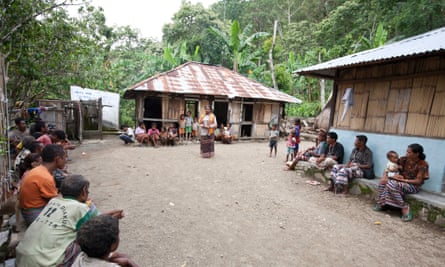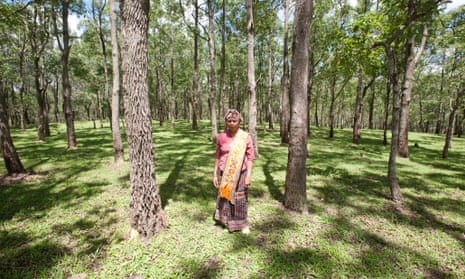In London, Paris and Washington, where leaders have made little progress in curtailing climate change, global warming may seem a merely theoretical problem – too far in the future, or too far away geographically, to matter.
But in remote tropical forest nations and islands, local leaders – especially women – are coming up with concrete, effective solutions to combat climate change in their communities. They do so not as a matter of politics, but as a matter of survival.
From the rainforests of Guatemala to the islands of Papua New Guinea, rural communities are losing their homes and livelihoods as their regions face bouts of extreme weather and new cycles of drought and flooding.
For women on the frontline of these changing landscapes, the devastating effects of climate change are not merely abstract; they can see a future marked by disease, malnutrition and loss of income.
Worldwide, the women and grassroots groups with whom we work are taking action to save the environment in concrete ways, from stopping deforestation in Indonesia to promoting clean energy in Nigeria. In the face of death threats and harassment, they drive their projects forward because their lives – and the lives of their children – depend on them.
Despite leading some of the boldest and most successful climate projects, however, they receive little attention and scant backing from typical funders and climate finance programmes.
In West Timor, Indonesia, for example, where carbon-sequestering forests are burned and plundered for mining and palm oil plantation, one courageous indigenous woman risked her life to shut down destructive mining projects.
On a minimal budget, “Mama” Aleta Baun, a mother of three, became a figurehead for other indigenous Mollo women. Staging sit-ins at four local mines, she helped to save the homes and ancestral forests of 130 indigenous families. Every day for more than a year, the women sat at the mines, weaving traditional cloth for turbans and skirts, and blocking the entrance to staff and equipment.
One night, as Baun headed home to look after her daughter, she was surrounded by about 30 men who wielded machetes and warned her that the mining company had hired them to kill her. She convinced them to take the little money she was carrying – about $20 (£12.72) – but not before the mob had cut her legs with their machetes and rammed her head into a tree.

Despite facing such extreme danger, Baun and her colleagues continued their protests, supported by small, targeted grants. Ultimately, their actions drove the mining companies to close their operations, saving the surrounding forests from further destruction.
The actions of women such as those in West Timor are bolder, nimbler, cheaper and more effective than those of large-scale international initiatives. Take the Green Climate Fund. Established at the Cancun climate talks four years ago and aimed at funneling $10-15bn to developing countries to fight climate change, the fund is billions of dollars short and has no mechanism for providing grants to groups like Baun’s.
If fund supporters start investing in small, inexpensive projects rather than multi-million dollar ones, they could make a major dent in climate change with the money they already have. By setting up a grassroots grant-making arm that feeds small amounts of funding to local groups, they could have an immediate impact on those already suffering the brunt of climate change.
The necessary infrastructure already exists. Each year, several independent grant-making organisations around the world channel tens of millions of dollars to local organisations led by women. Unlike expensive loans, which are often weighed down with stipulations, these smaller grants come with few strings attached, are distributed with minimal transaction costs and are easily accessible for women’s groups.
With grants as small as $5,000, local groups are having a big impact on climate change in their communities. They are organising protests to defend their land, expelling mining and oil companies from their forests, saving native seeds. They are adapting to changing conditions and promoting solar and wind energy.
But they could do more. Their projects are simple, inexpensive and replicable, and – with the backing of the Green Climate Fund and other finance programmes – they could make great strides in saving the climate, one community at a time.
Solutions to climate change exist. Not in the halls of buildings that host international climate meetings, but on the frontline of the battle to save our planet, where local leaders are already stepping up to the challenge. For them, climate change is neither far away, nor in the future. International funders must invest in the people who have the most to lose, and who are acting now.
Teresa Odendahl is CEO of the Global Greengrants Fund
